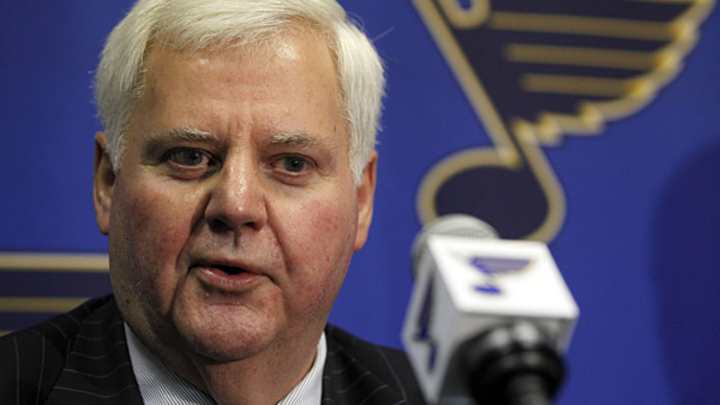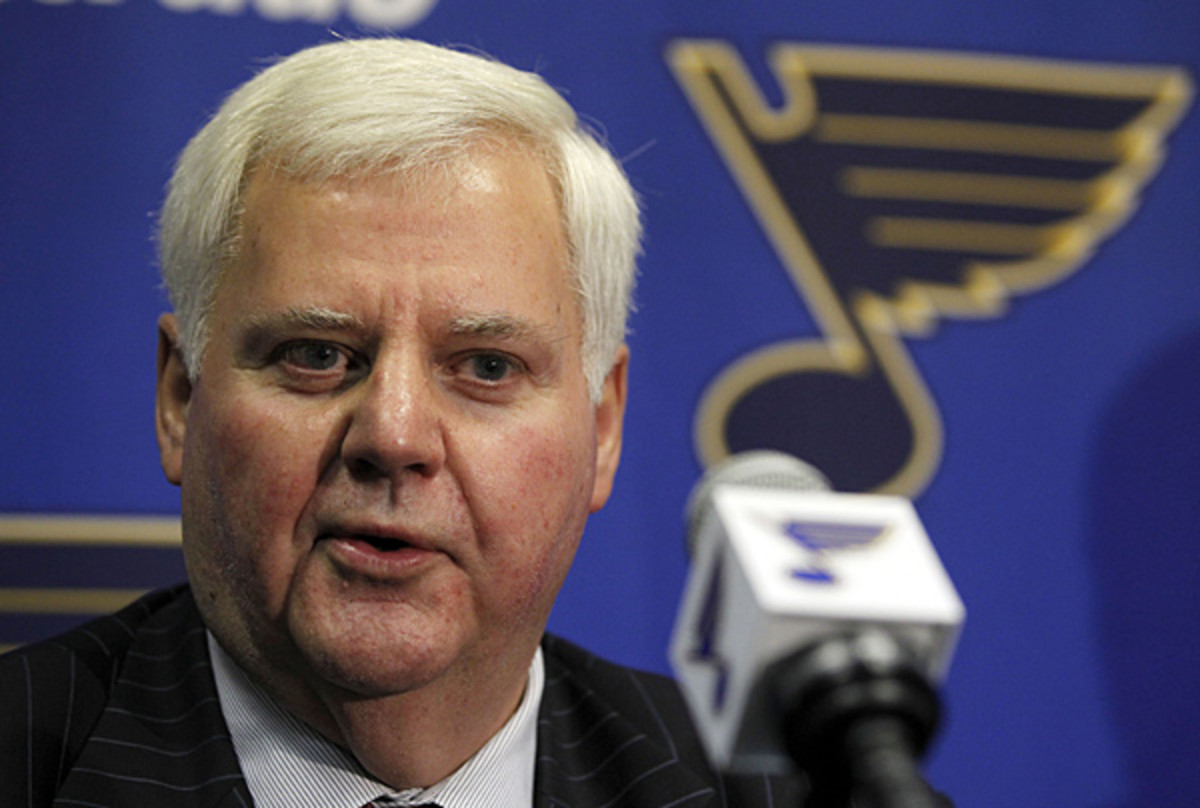New coach Ken Hitchcock, the Blues, and the NHL's 200-foot game

Ken Hitchcock is a Stanley Cup-winning taskmaster expected to whip the underachieving Blues into shape. (Jeff Roberson/AP Photos)

By Stu Hackel
Sunday evening, the axe fell for the first time this season on an NHL coach: Davis Payne, who told Jeremy Rutherford of The St. Louis Post-Dispatch the move was "shocking and disappointing." Other than Payne, not very many people were shocked because the only disappointing thing was his Blues' record (6-7-0). The bigger surprise to some is that Ken Hitchcock has replaced Payne, because the NHL rumor wire -- which has only a fleeting relationship with fact -- had Hitchcock resuming his old job as coach of the Blue Jackets.
This is really about the Blues, of course, so first, a few thoughts from Hitchcock's introductory press conference on Monday morning. If you expect the Blues to be a plodding defensive team in the mold of the Dallas club that Hitchcock led to the 1999 Stanley Cup, you're mistaken. He acknowledged that while he's not a young man any longer, he's learned how to adapt in a changing game, and the NHL has drastically changed since that championship season. Hitchcock called his neutral zone trapping veteran Stars club "kinda slow, but we played like an old dog" who sat back and waited for opponents to make mistakes and buried them. That strategy won't work now.
To win in the NHL now, he said, "you've got to be a 200-foot team, you've got to play really, really fast defensively, and then you've got to protect the puck like crazy offensively. So if you're going to win in this league, if you want to create your offense, you've got to play 200 feet now; you can't play in 150.
That doesn't mean he's abandoned his preaching defensive-oriented hockey, however. "Fast and loose offensively ends up in losses," he said. "Fast and tight defensively ends up in wins. I think this team has that capability."
But only in flashes, he added."Everybody has to be on the same page defensively and offensively for 60 minutes," Hitchcock said. "For us to become an elite team, it has to be consistent....You can't win in the league unless you've got everyone committed for 200 feet." That, to him, means getting hesitation out of the Blues game and making their play more automatic.
"The quicker you get the puck back, the more you have it," he said, the post-lockout rules mandating there are "no hold ups or box outs, so you have to get it back quickly." On offense, top teams patiently go to work using the puck-possession game to their advantage while forcing their foes into errors on defense. "San Jose, Detroit, Vancouver and Chicago. Those are the teams that do it on a nightly basis," Hitchcock added, saying if the Blues can get there, they'd be "in good shape."
He also said that he's watched every team in the league multiple times this season and has an extensive file on their tendencies. Hitchcock wanted to be ready with up-to-date information on the entire league, including the new team that hired him, and not have to rely on his assistant coaches to get him up to speed. Now he has his chance with a club that is run by people with whom he has had a long relationship: Blues president John Davidson, who Hitchcock said he's known since J.D. was "small and a goalie playing in the Western Hockey League," and GM Doug Armstrong, who was his boss when he coached minor pro and at the international level, not to mention assistant GM when Hitchcock coached the Stars. The Blues job was an opportunity he couldn't pass up.
Of course, the rumor mill had him coming back as coach of Columbus. Fewer unemployed coaches were more decorated than Hitchcock, and he was also rumoured to be in line for the Devils' coaching job this past offseason. His resume includes 533 wins, a .588 winning percentage, a Stanley Cup, two Presidents' Trophies, two Conference Championships, six division titles (including five straight with Dallas) and two Olympic gold medals as a Team Canada assistant. As Bob Hunter of The Columbus Dispatch wrote recently, "Hitchcock knows more about hockey than anybody in the city." Similarly, Armstrong called him "the smartest hockey man in this room" at Monday's press conference.
[vodpod id=Video.15659940&w=425&h=350&fv=catid%3D782%26amp%3Bid%3D133377%26amp%3Bserver%3Dhttp%3A%2F%2Fvideo.blues.nhl.com%2Fvideocenter%2F%26amp%3Bpageurl%3Dhttp%3A%2F%2Fvideo.blues.nhl.com%2Fvideocenter%2F%26amp%3Bnlwa%3Dhttp%3A%2F%2Fapp2.neulion.com%2Fvideocenter%2Fnhl%2F]
The Blue Jackets, easily the NHL's worst team with only five of a possible 28 points, had been paying him $1.33 million this year not to coach them. They relieved Hitch from that post in February 2010, a season-and-a-half removed from guiding Columbus to its only postseason berth in franchise history. He's still had a good relationship with the Jackets' hierarchy, however, and rather than have him sit home and drain their bank account while doing nothing, team president Mike Priest asked Hitchcock to work with their minor league coaches. He was also seen frequently watching the Blue Jackets practice and play.
The fact that Hitchcock's presence was so conspicuous around Columbus inevitably gave rise to rumors that he'd be taking over for Jackets' coach Scott Arniel after the team fell flat on its face as soon as the season began. There was even speculation that he'd take over for GM Scott Howson. While Priest strongly denied that he ever spoke with Hitchcock about coaching the team again, the rumors continued. Hitchcock echoed Priest's words on Monday, saying that taking over Columbus had never been discussed. Instead, he maintained the reason he was seen frequently in Columbus was that the club allowed him to watch games so he could compile his dossiers on the clubs to help him get his next coaching job.
Hitchcock's viability with the Jackets didn't sit well with some: While Columbus was in the process of being obliterated by the Flyers 9-2 on Saturday night, Mike Milbury on Hockey Night in Canada's "Hotstove" (video) said Hitchcock being around that team was "not smart. That's not good and that's not cool for him to be doing it. He might be desperate to get back in the game and, hey, God bless him. He's done some good things as a coach. But that's no way to go about it, sit on the guy's shoulder and watch for the hammer to come down."
Yes, the optics may have been bad. But now it's clear that Priest wasn't prepping Hitchcock to take over. Even if he had been, how would that have made Hitchcock the bad guy? You don't often say no to someone who is paying you $1.33 million. In any case, it all proved to be illusion.
Priest has held firm -- at least for the moment -- on his pledge not to make changes as long as his coach and GM don't have the full complement of stars they acquired in the offseason. James Wisniewski's preseason suspension bled eight games into the regular season and Jeff Carter broke his foot before Wiz returned; they have yet to play together in a meaningful game. When the Blues came asking for permission to speak with Hitchcock, Priest said yes. If he wanted Hitchcock to coach Columbus, he would have said no. He was likely overjoyed to get what's left of Hitchcock's $1.33 million off his books.
And that brings us back to the Blues and Payne. They've started the season better than Columbus -- well, everyone has -- and beaten the Canucks twice, but at 6-7-0, they are still 14th in the West. That's only three points out of a playoff spot at the moment, but it's also ahead of only Columbus and there are lots of teams over which the Blues must climb to get where they have to go.
On Saturday, Armstrong told the Post-Dispatch's Rutherford, "When you look at our schedule, having to go coast to coast and play eight of our first 11 on the road, we hoped to be a couple of games over .500 now."
The Blues feel they have to make the playoffs this season and in today's NHL, .500 isn't good enough. You need to finish with around 95 points to qualify and St. Louis not only wasn't on that pace, Armstrong and Davidson obviously thought the Blues were heading for the golf course in April. They watched prized youngsters like Patrik Berglund stagnate, noticed the poor special teams play (last on the power play, 27th on the penalty kill), looked at their team's weird schedule (one of many in the NHL), saw they were about to begin a five-game homestand and figured now was the time to make the move.
Asked how long it would take to fix the decrepit power play -- which is 3-for-40, 7.5 percent as of this writing -- Hitchcock said, "One practice."
Beyond their familiarity with Hitchcock, Armstrong and Davidson wanted his experience. While Payne is widely considered a bright young coach, comparing his resume to Hitchcock's easily reveals which man would more likely prod the Blues to take the next step. Moreover, Hitchcock is a tough taskmaster, Given the Blues' inconsistency this season, Armstrong and Davidson obviously believed a demanding approach was called for. They've now hired a successful coach who knows the contemporary 200-foot game and the league well and, as Armstrong told a local TV reporter after the press conference, Hitchcock is a coach in which the front office has complete confidence. "It's up to our players to respond," Armstrong said.
Of course, there was perhaps an additional element in Armstrong and Davidson making the move now. The sale of the franchise seems to be proceeding, with Matthew Hulsizer putting the new group together. Any time a new ownership group comes in, there's bound to be uncertainty for the hockey department. They want to keep their jobs and making this move now could make or break their futures in St. Louis.
The situation could be compounded by the presence of former Lighting ownership partner Oren Koules as one of Hulsizer's partners. That has led to speculation that Koules' former Tampa Bay GM, Brian Lawton, could be in line for a spot with the Blues. As long as we're comparing resumes here, the relative strengths of Armstrong's and Lawton's should be obvious. That may not stop an owner who has demonstrated a history of cronyism. It certainly won't stop the rumors either.
